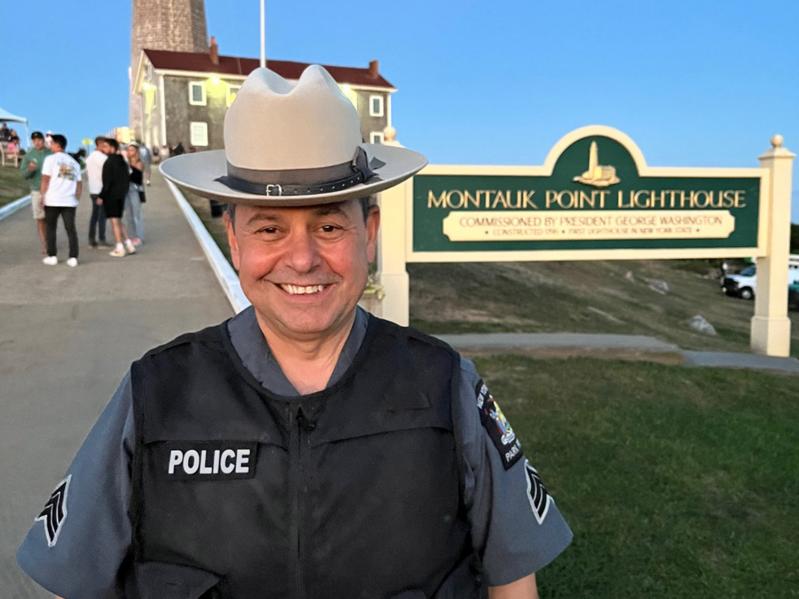After more than 38 years of service, Manny Vilar of Springs retired on Sunday from the New York State Park police, and with mixed emotions.
The police agency operates from urban areas in New York City to ocean beaches on Long Island, and in natural areas and areas of rugged terrain across the state, according to its website.
Officers with the park police have a broad mandate to "handle very large crowds, assist park users, perform search-and-rescue duties for missing persons, make arrests, conduct criminal and noncriminal investigations, and provide emergency services wherever and whenever they are needed."
They also perform marine law enforcement and education on the state's waterways, snowmobile enforcement and education, and water rescue.
"Everyone thinks state parks are quiet in the winter," said Mr. Vilar, who was also East Hampton Town's last elected bay constable. "They're not. I would say it's like East Hampton's tourist season, but on steroids."
After attending the police academy with the intention of joining the East Hampton Town Police Department, in 1984 Mr. Vilar took a part-time job with the State Park Police at the encouragement of late assemblyman Perry B. Duryea Jr. of Montauk. He went to full-time status two years later and was promoted to sergeant in 1992.
"I went from one day being out at Jones Beach to the next day in the South Bronx," Mr. Vilar reflected, "in the confines of the 46th Precinct, in Morris Heights."
Over eight years in the Bronx, Mr. Vilar said he "ran their marine bureau, did the court liaison for the five boroughs, spent a lot of supervisory-patrol time in the South Bronx, and in Washington Heights and Harlem, in the confines of the 30th precinct. I ran their marine bureau and had a host of administrative roles."
Mr. Vilar eventually returned to Long Island where he says he got deeply involved in labor issues at the police union, which he recalled "did a horrible job representing members."
The local tended to march to a national mantra, he said, "and they're not very representative of the local union members on the ground."
Mr. Vilar eventually led an insurgency intended to decertify the union and create a new one -- and in the late aughts, Mr. Vilar was sucessful in helping create the Police Benevolent Association of New York State.
"Overnight, in 2011, we became the fifth-biggest police union in New York State," Mr. Vilar said, representing around 1,200 members that includes State University of New York police, State Department of Environmental Conservation police, State Park Police, and State Forest Rangers.
The new job led him to Albany, where he spent ample time "both on the labor-relations side and the legislative side, working in the Legislature to represent my members. I had some tremendous successes legislatively, got a couple of bills signed by the governor — and got a lot of bills vetoed by the governor."
That experience led to a deeper involvement in politics. After a campaign for town supervisor in 2017 and another for councilman in 2018, the East Hampton Town Republican Committee named Mr. Vilar its chairman, a post he continues to hold.
Mr. Vilar retired from the P.B.A. in June, at the conclusion of Albany's legislative session, and then from the State Park Police on Sunday.
"I've had an incredible, diverse career, an experience I would never have gotten anywhere else," he said, likening his job to that of "a local town cop, a state trooper, a New York City cop, a transit cop, a housing cop, all in one job."
Mr. Vilar recently launched Accabonac Strategies, an Albany lobbying group, and the not-for-profit Retired Police Benevolent Association of New York, which was conceived following a successful effort to help the widow of a D.E.C. officer who succumbed to a cancer related to his service as a first responder at the World Trade Center in Manhattan following the Sept. 11, 2001, terrorist attack.
"Hopefully, we can get this off the ground," Mr. Vilar said of his new venture, "and be a resource for these families and first responders, dealing with legislation in the State Legislature."
Mr. Vilar himself spent six weeks at Ground Zero following 9/11.
"You can't be a police officer without experiencing a lot of death," he said. "I've seen a lot of heartbreak and horror. But I have to tell you, being there was probably the worst six weeks of my life."
His time at the World Trade Center, he said, informed the creation of the R.P.B.A.
"A lot of people with serious illnesses are fighting the fight of their lives because of their dedication to duty on 9/11," Mr. Vilar said. "It doesn't get talked about enough."
His new venture fits with his penchant for public service, Mr. Vilar said, as he recalled serving on the Montauk and Springs fire departments and coaching Little League.
"I believe in giving back and working for the community."

